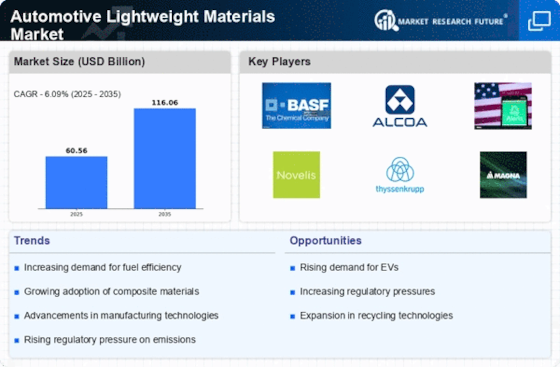Top Industry Leaders in the Automotive Lightweight Material Market
*Disclaimer: List of key companies in no particular order
Latest Company Updates:
Shedding Pounds, Gaining Performance: Exploring the Competitive Landscape of the Automotive Lightweight Material Market
Beneath the sleek curves of modern vehicles, a silent battle rages – the automotive lightweight material market. This multi-billion dollar space pulsates with activity, with established giants, nimble innovators, and regional specialists vying for a share in trimming the fat off cars, trucks, and beyond. Let's delve into the key strategies, market dynamics, and future trends shaping this dynamic landscape.
Key Player Strategies:
Global Titans: Companies like ArcelorMittal, Novelis, and Magna International leverage their extensive production footprints, diverse material portfolios, and strong financial backing to maintain their dominance. They cater to major automakers, offering established lightweight materials like high-strength steels and aluminum alloys for various vehicle components. Novelis' aluminum body sheets showcase their focus on high-volume production and established lightweighting solutions.
Technology Disruptors: Startups like Impossible Composites and Lanxess are disrupting the market with next-generation technologies like carbon fiber composites, advanced plastics, and innovative manufacturing processes. They cater to high-performance vehicles and niche applications, offering superior strength-to-weight ratios and weight savings. Impossible Composites' continuous fiber-reinforced thermoplastic composites exemplify their focus on cutting-edge materials and lightweighting efficiency.
Cost-Effective Challengers: Chinese manufacturers like Baosteel and China Aluminum Corporation are making waves with competitively priced lightweight materials, targeting cost-conscious automakers in emerging markets. They focus on affordability and basic functionality, offering alternatives to premium brands. Baosteel's cold-rolled high-strength steel sheets demonstrate their focus on cost-sensitive solutions for mass production.
Niche Specialists: Companies like PKC Group and Evonik Industries excel in specific lightweighting segments, offering tailored solutions for specific components like wheels, seats, and interior parts. They leverage deep understanding of niche requirements and offer weight reduction solutions with minimal performance compromise. Evonik's Rohacell® lightweight foam exemplifies their focus on specialized applications and weight reduction in interiors.
Factors for Market Share Analysis:
Material Performance and Weight Savings: Offering lightweight materials with superior strength, stiffness, and corrosion resistance, leading to significant weight reductions and improved fuel efficiency, is paramount. Companies with high-performance materials gain an edge.
Cost and Affordability: Balancing advanced features with competitive pricing is vital for mass adoption, particularly in cost-sensitive markets. Companies offering affordable lightweight solutions without compromising safety or performance stand out.
Technological Innovation and Processing: Investing in R&D for next-generation lightweight materials, optimizing manufacturing processes for cost-effectiveness, and collaborating with automakers on design integration are crucial for staying ahead of the curve. Companies leading in innovation attract premium contracts and early adopters.
Sustainability and Recycling: Utilizing recycled materials, implementing energy-efficient production processes, and ensuring responsible end-of-life recycling for lightweight materials attracts environmentally conscious customers and potential regulatory benefits. Companies prioritizing sustainability gain an edge.
New and Emerging Trends:
Focus on Multi-Material Optimization: Combining various lightweight materials like steel, aluminum, and composites in strategic vehicle components allows for targeted weight reduction and optimal performance optimization. Companies offering expertise in multi-material integration stand out in this complex but effective approach.
Additive Manufacturing and 3D Printing: Utilizing 3D printing for intricate lightweight components opens up design possibilities and reduces material waste. Companies investing in additive manufacturing cater to the demand for bespoke lightweight solutions and complex geometries.
Focus on Lifecycle Carbon Footprint: Addressing the full environmental impact of lightweight materials, from extraction and production to end-of-life recycling, is gaining importance. Companies demonstrating low carbon footprint solutions gain market share.
Collaboration and Open Innovation: Partnering with automakers, material suppliers, and technology providers for collaborative research and development of lightweight solutions accelerates innovation and reduces risks. Companies embracing open innovation gain a competitive edge.
Overall Competitive Scenario:
The automotive lightweight material market is a dynamic and complex space with diverse players employing varied strategies. Established giants leverage their reach and diverse portfolios, while technology disruptors introduce innovative solutions. Cost-effective challengers cater to budget-conscious buyers, and niche specialists excel in specific applications. Factors like material performance, affordability, technological innovation, and sustainability play a crucial role in market share analysis. New trends like multi-material optimization, additive manufacturing, lifecycle carbon footprint focus, and collaborative innovation offer exciting growth opportunities. To succeed in this evolving market, players must prioritize innovation, cater to diverse customer needs, embrace sustainable practices, and explore technology-driven solutions. By shedding pounds without compromising performance, they can secure a dominant position in the fast-moving race of automotive lightweighting.
Covestro AG:
- October 26, 2023: Partnered with Ford to develop high-performance composites for lightweight truck beds. (Source: Covestro press release)
ArcelorMittal:
- December 5, 2023: Announced $1 billion investment in sustainable steel production, including lightweight automotive solutions. (Source: ArcelorMittal press release)
LyondellBasell Industries Holdings B.V.
- October 27, 2023: Showcased sustainable polypropylene solutions for lightweight electric vehicle (EV) battery enclosures. (Source: LyondellBasell press release)
ThyssenKrupp AG:
- November 22, 2023: Successfully trialled production of ultra-high-strength steel for lightweight car doors. (Source: ThyssenKrupp press release)
Toray Industries Inc.
- December 12, 2023: Expanded production capacity for carbon fiber composites used in lightweight automotive parts. (Source: Toray press release)
BASF SE:
- October 27, 2023: Collaborated with LyondellBasell to develop lightweight composite materials for automotive applications. (Source: BASF press release)
Top listed global companies in the industry are:
Covestro AG
ArcelorMittal
Lyondellbassel Industries Holdings B.V.
ThyssenKrupp AG
Toray Industries Inc.
BASF SE
Novelis Inc.
Alcoa Corporation
Owens Corning
Stratasys Ltd.











